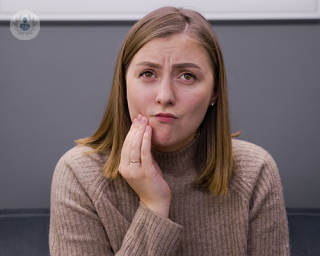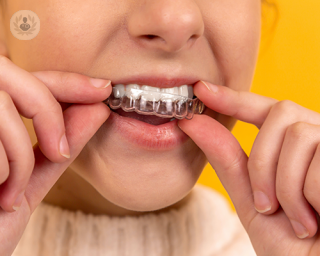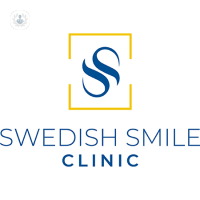Bruxism
What is it?
Bruxism, more commonly known as teeth grinding, is when a person clenches or grinds their teeth. This can cause temporomandibular joint (TMJ) problems and wear and tear of the tooth surface. The condition affects between 10 and 20 per cent of the population. It may happen during the day or throughout the night, although it is more common when sleeping, when it is much more difficult to control.

What is the outlook?
Teeth grinding isn’t dangerous, but it can lead to other problems, such as permanent tooth damage, jaw or ear pain, headaches and migraines, or temporomandibular joint and muscle (TMJ) disorders. It may cause other issues such as insomnia, depression, or eating disorders.
What are the symptoms?
In the development of the mouth, If the tongue is not seated on the palate during swallowing and occupies a higher position, the mouth will stay narrow, which can lead to a narrow nasal cavity and breathing disorder. The mouth is then forced to take in the air, the tongue may be in the way and the jaw has to move forward to open the airway. In the process of moving the jaw forward, muscles are activated that can cause teeth grinding.
Grinding or clenching teeth can put pressure on the oral structure: muscles, tissues, and jaw. This pressure translates into:
- anxiety, stress, and tension
- earache, as some temporomandibular joint structures are close to the outer ear canal. The pain may not be directly in the ear, and rather may be referred pain from a nearby area
- eating disorders
- headache
- muscle sensitivity, especially in the morning
- dental sensitivity when consuming hot, cold, or sweet foods
- insomnia
- jaw pain or swelling
- migraines
These are general symptoms, although some people may grind and clench their teeth but show no symptoms. Things that can affect how long the clenching lasts include patient stress levels, teeth not being aligned, posture, diet, and sleeping habits.
How is bruxism diagnosed?
Many people aren’t aware that they have bruxism and they normally find out when undergoing a routine dental check-up or due to face or neck pain. In some cases, a person is told that they have been heard grinding their teeth while sleeping. Physical examinations and X-rays can confirm diagnosis.
An electromyogram (EMG) can check the intensity and frequency of bruxism during the day or night by evaluating the muscles used for chewing. A polysomnography can also be done to check brain and muscle activity during sleep.
What causes it?
Whether bruxism affects the person during the day or at night, it is an involuntary habit. There isn’t a known cause for bruxism, although it is known that stress and anxiety may be a factor in some patients. Genetic factors have also been linked to teeth grinding. Tooth alterations such as malocclusion (bad bite), central nervous system mechanisms, and muscle problems have been known to trigger it.
How can it be prevented?
Reducing stress and anxiety levels are methods that can help reduce teeth grinding but cannot necessarily prevent it if there are other factors involved.
How is bruxism treated?
Treatment will always involve ensuring there is no damage to the teeth or muscles. Depending on the severity of the case and how much it may affect the teeth, different treatments will be suggested:
- Relaxation. For some people, learning relaxation techniques and changing daily habits is enough. Massaging the face, head and neck in particular can help to relax the muscles.
- Occlusal or discharge splint. This is a resin or plastic dental protector that is used in severe cases. It treats the symptoms but not the cause in order to prevent tooth damage. It stops jaw, head, and ear pain from when it is used. The patient can wear it during the day, at night, or both, depending on the intensity of the bruxism and what the specialist recommends. It should be noted that occlusal splints do not get rid of bruxism.
As well as treatments, advice is often given, including:
- apply ice or damp heat to jaw muscles
- avoid hard foods such as nuts
- avoid chewing gum
- drink plenty of water
- get about 6-8 hours of sleep a day
- try to find ways to reduce sources of daily stress
Botulinum toxins are used to alleviate the symptoms of clenching and grinding. It is injected into the muscles of mastication to paralyse the muscles, preventing contraction reducing the symptoms. Occlusal splints are a recognised treatment for preventing migraine headaches.
What specialist should I see?
Teeth grinding or bruxism can be treated by a maxillofacial surgeon or a dental specialist.
Can dental disorders contribute to teeth grinding?
Yes, As mentioned above, if the tongue is not positioned correctly in the mouth, one's breathing can become affected and one's jaw will stiffen up as a result.
In the long run, what problems can bruxism lead to?
Untreated bruxism over a prolonged period of time can cause severe damage to your teeth as well as your overall general health. Bruxism has an adverse effect on one's breathing, and airway problems can lead to hypertension and cardiovascular disease. Hyperactivity of the muscles in an uneven bite causes the teeth to wear down and eventually lose back teeth support.

















